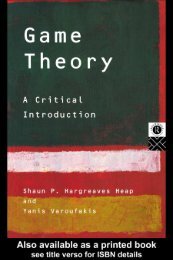handbook-executive-leadership-of-research-development-pdf-v10
handbook-executive-leadership-of-research-development-pdf-v10
handbook-executive-leadership-of-research-development-pdf-v10
Create successful ePaper yourself
Turn your PDF publications into a flip-book with our unique Google optimized e-Paper software.
By far the best background or environmental predictor <strong>of</strong> individual output is anacademic’s membership <strong>of</strong> an active <strong>research</strong> department. He or she is, accordingto one study, four times more productive than his or her colleagues in one <strong>of</strong> the lessvigorous units (partly because <strong>of</strong> selection effects, but also because high levels <strong>of</strong>total output stimulate individuals to do more). ‘Active <strong>research</strong>’ will vary by disciplineand is related to esteem, but includes things such as being involved in <strong>research</strong>projects, gaining <strong>research</strong> funds, supervising postgraduates, editing journals,being invited to give papers and attending scholarly meetings). ‘Active’ <strong>research</strong>departments, with a strong culture <strong>of</strong> <strong>research</strong> quality and support for staff to develop<strong>research</strong> careers, produce more publications for their size than less active ones 5 .What factors hinder <strong>research</strong> engagement and productivity? In addition to theindividual and environmental aspects implicit in the above paragraphs, perhapsthe most significant revolve around the critical importance to a sense <strong>of</strong> academicidentity, productivity and overall work satisfaction <strong>of</strong> an individual’s autonomy topursue personal academic interests. Academics, in contrast to most workers, haveusually been able to declare their preferences for the type <strong>of</strong> work that best suitstheir interests and the subjects about which they are enthusiastic at a particular pointin time. These interests may have had their genesis as far back as undergraduatestudy. Being able to focus on their own interests and being able to make choicesamong them provides academics with a sense <strong>of</strong> personal satisfaction and credibilityamongst the community <strong>of</strong> scholars; it also satisfies the desire to make an originaland ongoing contribution to knowledge. The main predictor <strong>of</strong> work satisfaction foracademics, clearly ahead <strong>of</strong> salary and job security, is the opportunity to pursue theirown academic interests 6 .Because intrinsic motivation plays such a decisive role in productivity, it is importantfor leaders to consider what factors might attenuate this enthusiasm. Makingchoices about teaching and <strong>research</strong> is increasingly less likely for large numbers <strong>of</strong>academics. The nature <strong>of</strong> freedom and autonomy amongst tenured academics overwhat is <strong>research</strong>ed and taught can no longer be taken for granted 7 .Self-regulation in the management <strong>of</strong> work and its implications for academic identityare easily underestimated as a defining element in academic identities. Academicsplace a premium on the freedom they have to manage their work in ways thatsuit their personal priorities and approaches to <strong>research</strong> and teaching. Autonomyover what academics will teach and <strong>research</strong> extends to setting their own prioritiesA background briefing on the evidence13



